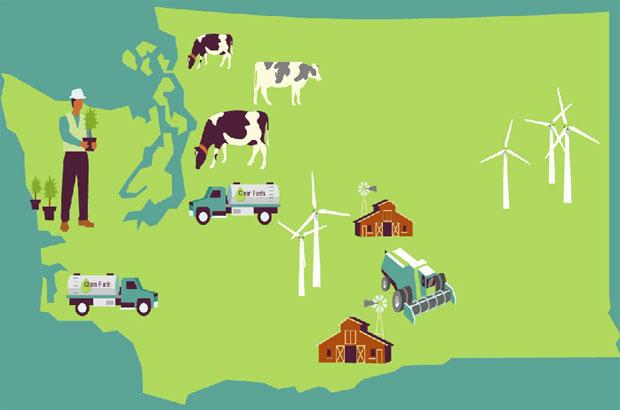Excerpt from op-ed in Dec 18-23 issue of Real Change:
We all use transportation to take us places — work, errands, celebrations, important appointments — and we all rely on a variety of public transit and personal vehicles. We all deserve to move safely, freely and efficiently; there’s no reason we shouldn’t also have a clean transportation system that doesn’t worsen our air quality, accelerate the climate crisis and negatively impact our health.
Transportation is our largest source of climate and air pollution in Washington. Every day, millions of fossil fuel engines on our roads increase particulate matter in our air, impacting all of us — transit riders, students walking home from school along busy roads and drivers mired in traffic.
We can breathe cleaner air and transform our transportation system to serve everyone by following two strategies: We can replace big oil’s monopoly on transportation fuel with a mix of clean electricity and sustainably produced biofuels, and we can reduce our reliance on single-occupancy driving, offering more Washingtonians access to mass transit and safe infrastructure for walking and biking.
We can act now on both of these strategies with a clean fuel standard that requires oil producers and refiners to sell us cleaner-burning gasoline and diesel. Mandating cleaner fuels will also put as many as 700,000 electric cars, trucks and buses on the road. This standard is unfinished business in Seattle from 2019 but under consideration again in 2020, this time at both the state and regional level.
Washington is still the only place on the West Coast without a clean fuel standard: British Columbia, Oregon and California all implemented their policies years ago and are continuing to reap the benefits of cleaner air, health costs savings and more electric vehicles.
Burning fossil fuels releases all kinds of particulate matter and pollution in the air, including microscopic, ultrafine particles so small that they get deep into our lungs and bloodstream. This pollution causes serious health problems like premature death in people with heart or lung disease, aggravated asthma, decreased lung function and increased coughing or difficulty breathing. That’s why the Washington State Medical Association, the American Lung Association and the Washington Academy of Family Physicians have called for immediate legislative action to enact a clean fuel standard and pursue cleaner transportation options overall.
Washington always prospers when it leads: First, aviation; then, technology; then, e-commerce. The time to ensure we’re on the forefront of the clean energy transition is now. There’s no time to lose — we need clean fuels now and to invest in safe, clean and affordable transportation to get where we need to go.
The Puget Sound Clean Air Agency is holding a public hearing on a regional clean fuel standard on Dec. 19 from 12:30 p.m. to 8 p.m. at the Washington State Convention Center. We urge you to join us there.
